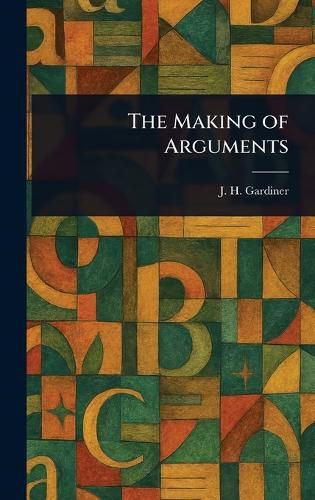Readings Newsletter
Become a Readings Member to make your shopping experience even easier.
Sign in or sign up for free!
You’re not far away from qualifying for FREE standard shipping within Australia
You’ve qualified for FREE standard shipping within Australia
The cart is loading…






This title is printed to order. This book may have been self-published. If so, we cannot guarantee the quality of the content. In the main most books will have gone through the editing process however some may not. We therefore suggest that you be aware of this before ordering this book. If in doubt check either the author or publisher’s details as we are unable to accept any returns unless they are faulty. Please contact us if you have any questions.
"The Making of Arguments" by J.H. Gardiner offers a comprehensive exploration of rhetoric, debate, and the art of persuasive writing. This meticulously prepared edition revives a classic text on argumentation, providing timeless guidance for anyone seeking to master the principles of effective communication. Delve into the core elements of composition and discover techniques for constructing compelling arguments. Whether you are a student of language, a teacher of writing, or simply interested in honing your persuasive abilities, this book provides a solid foundation in the enduring principles of rhetoric. Explore the subject of debates and debating through the lens of a master, and unlock the secrets to crafting arguments that resonate and persuade. A valuable resource for understanding the foundations of effective written and spoken discourse.
This work has been selected by scholars as being culturally important, and is part of the knowledge base of civilization as we know it.
This work is in the public domain in the United States of America, and possibly other nations. Within the United States, you may freely copy and distribute this work, as no entity (individual or corporate) has a copyright on the body of the work.
Scholars believe, and we concur, that this work is important enough to be preserved, reproduced, and made generally available to the public. We appreciate your support of the preservation process, and thank you for being an important part of keeping this knowledge alive and relevant.
$9.00 standard shipping within Australia
FREE standard shipping within Australia for orders over $100.00
Express & International shipping calculated at checkout
This title is printed to order. This book may have been self-published. If so, we cannot guarantee the quality of the content. In the main most books will have gone through the editing process however some may not. We therefore suggest that you be aware of this before ordering this book. If in doubt check either the author or publisher’s details as we are unable to accept any returns unless they are faulty. Please contact us if you have any questions.
"The Making of Arguments" by J.H. Gardiner offers a comprehensive exploration of rhetoric, debate, and the art of persuasive writing. This meticulously prepared edition revives a classic text on argumentation, providing timeless guidance for anyone seeking to master the principles of effective communication. Delve into the core elements of composition and discover techniques for constructing compelling arguments. Whether you are a student of language, a teacher of writing, or simply interested in honing your persuasive abilities, this book provides a solid foundation in the enduring principles of rhetoric. Explore the subject of debates and debating through the lens of a master, and unlock the secrets to crafting arguments that resonate and persuade. A valuable resource for understanding the foundations of effective written and spoken discourse.
This work has been selected by scholars as being culturally important, and is part of the knowledge base of civilization as we know it.
This work is in the public domain in the United States of America, and possibly other nations. Within the United States, you may freely copy and distribute this work, as no entity (individual or corporate) has a copyright on the body of the work.
Scholars believe, and we concur, that this work is important enough to be preserved, reproduced, and made generally available to the public. We appreciate your support of the preservation process, and thank you for being an important part of keeping this knowledge alive and relevant.